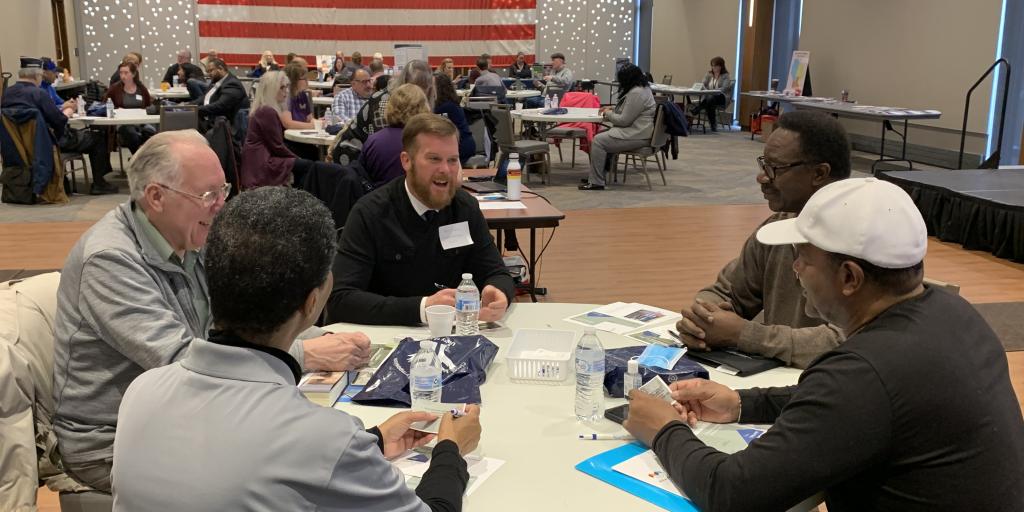'Connecting and engaging:' Event helps clergy, community groups better serve Veterans

Breaking down walls and building relationships.
Those were the goals of the first Clergy and Community Symposium that took place Thursday, March 24, at the War Memorial Center in Milwaukee, hosted by the Milwaukee VA Medical Center’s chaplains.
And by all accounts, it was successful.
“I thought it went well,” said Robert Allen, head of chaplain services at the Milwaukee VA. “A lot of people were connecting and engaging with each other — sharing their passion, sharing what they do — which is what I wanted. It was Vet-centered, and we had the VA (presenters) break down some myths and provide information about the services we offer.”
Envisioned as a way to help local clergy and community groups connect Veterans to VA services, the event emphasized sharing of resources and forging connections.
“It’s vitally important that we build these lasting relationships,” said Milwaukee VA Chaplain Anthony Harris. “This is just the beginning. Once we depart here, we have to take it out and build those relationships.”
About 50 organizations — ranging from local churches to organizations that serve Veterans — took part in the symposium.
Participants said they walked away with ideas on how to better services Veterans as well as information on what services are provided by VA and other groups.
“This helped me become more aware of the resources at the VA,” said David Brynelson, chaplain for Heartland Hospice of Madison. “I want to take this information back to my colleagues so we know how to … tap the resources of the VA so we can better help Veterans.”
“This event helped me understand the comprehensiveness of how much care is out there and how much we’re all dealing with the same issues of how to reach our Veterans and get them to the right place,” said Ben Singleton, manager of Heaven’s Gait Ranch, a therapeutic riding center in Cedar Grove.
How VA can help
Presenters from the Milwaukee VA offered information on a variety of services, including Whole Health, mental health services and programs geared to post-9/11 Veterans.
There was also information on how Veterans can learn about their eligibility for VA care and get enrolled.
Eligibility and enrollment specialist Kimberly Williamson noted that VA is working to make the process as easy as possible for Veterans with the launch of a nationwide enrollment phone number: 1-877-222-8387 (press 1). They can also get help online at www.va.gov or through their county’s Veteran service officer.
She also dispelled the myth that only Veterans who saw combat are eligible for health benefits.
“That’s totally wrong. Every Veteran’s situation is different,” she said. “We really want to get these Veterans enrolled, because there is so much the Milwaukee VA does for our Veterans.”
Clergy on the front lines
Kimberly Willis of the National VA Chaplain Service noted how important pastors and other church leaders are in addressing Veterans’ needs.
Especially in rural areas, Veterans are less likely to have access to VA services, Willis said. And when it comes to mental health services, VA discovered there were no licensed psychologists in 93 percent of 740 rural communities that were surveyed.
Filling that void for many rural Veterans are local pastors and church leaders. And helping those local clergy is the goal of the Rural Community Training Program.
The program helps connect church leaders to VA services while also providing training in four areas: moral injury, mental health, suicide prevention and community partnerships.
“You become that primary provider,” she told the attendees. “And we want to make sure you have all the skills and tools that you need.”
Since its inception in 2010, the program has been credited with saving the lives of more than 1,000 Veterans who had either contemplated or attempted suicide, she said.
“You are saving lives,” Willis said. “You are truly on the front lines. You are the person that Veteran goes to first. You are there to provide that care for them.”
Helping VA as well
While one goal of the event was to share with the community what VA does, it also worked the other way, Allen said.
“We learned about (programs) that we didn’t even know existed,” he said. “So now we have a database (to help) Veterans.”
Allen hopes to make the symposium an annual event, with the goal of continuing to break down walls and share resources.
“This is about building that relationship and rapport … (and) bringing people together,” he said.
